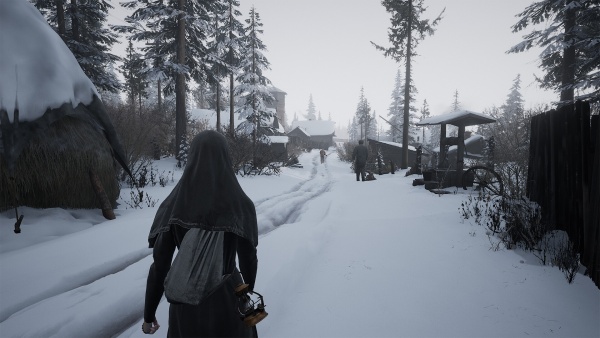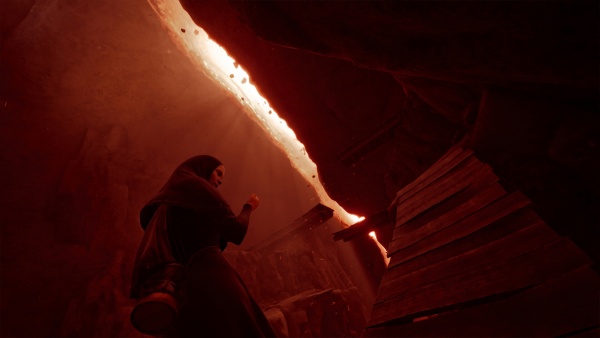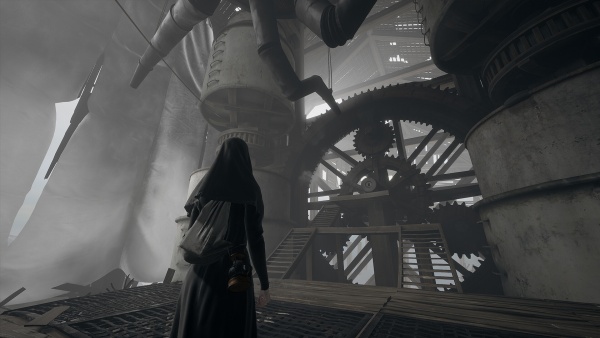Providing a review for INDIKA is going to be a tough thing to do. Very infrequently in gaming, there is a game in which a traditional review doesn’t simply cut it. Why? Because deep down we all know reviews are subjectively lead, rather than objectively. But more importantly, a game can be more than just fighting the Locus on Sera or matching colourful falling blocks to a Soviet tune. Sure, most games make us feel something profound, and engulf us with love, awe and feelings we never knew we had. Then there are games so obscure, completely derailed, and go beyond the conventional logic of gaming both in design and thematically.
What is INDIKA? 
What the Hell is INDIKA indeed?
INDIKA is a narrative lead, third-person adventure game, that dives into gravitas-induced subject matters, from religion, good and evil, conviction and faith. Set within an alternative Russia at the turn of the 20th century, where war, religious zealotry, and internal strife rule supreme, all these hardships are centred on a young nun named INDIKA.
What follows is a bleak venture of self-discovery for INDIKA, with a bout of the most unusual visions, twists and turns in the road, and the journey is accompanied by someone who knows a thing or two about good and evil, the devil himself.
INDIKA will face moral dilemmas, debates on choice, and seeing and feeling the worst that hypocritical humanity has to offer to keep her faith and prove her worthiness to God. It’s a strange, often bleak and hopeless tale, with the story's core being … Don’t try, and you Don’t succeed, as it means nothing at the end of the day.
INDIKIA is a game which best summed up feels like a fever dream project from POOR THING’s director, Yorgos Lanthimos, down to even some interesting choices with a fish lens camera angles, extreme closeups, and the undertone of choice. With plenty of walking, exploring, and picking up random goodies, many will call this a walking sim, which is far from the truth. There are chase sequences, majestic lateral elements, and neat little 16-bit set-pieces representing something from an SNES game, representing a time long gone by for INDIKA.
This is surely a game that will impress plenty of people while leaving others confused and frustrated.
So how can I break it down?
The Devil is in the detail 
The one thing I immensely admire about INDIKA is its world-building. There have only been a few games which made me want to explore the world in person, even if it’s decaying, and morbid. And an alternative Russia where there are factories that capture and process fishes in all shapes and sizes, some of which are behemoths in scale, that also produce massive cans of caviar piqued my interest and made me want to learn more about it. It’s a world where you enter a room and there’s about a hundred pipes, and valves, all ranging from massive to the size of a baby mouse, and you gauge that it makes sense here, even if it looks completely mad.
The further I went along with INDIKA, seeing steampunk bikes, cities made from stone that twist and turn in on themselves, and giant dogs only made my mind wonder more and more. Interestingly enough, religious aspects and various other elements are much more grounded in nature, providing something strange, yet oddly familiar.
Again, like something by Yorgos Lanthimos. The world-building is phenomenal, providing fascinating discovery and lore, be it curiously beautiful, or morbidly bleak.
As for the story, it’s quite the tale. One that delivers on plenty of questions but reframes from giving you all the answers. INDIKA is rather unpopular as a nun, her home is filled with bitter old women who dislike her, despite her best efforts to gain favour (which is represented by a token meter, something similar again to a retro SNES game … yes).
She is sent off on an errand to deliver an essential letter, but along the way, she gets caught up with a runaway prisoner looking to visit the holy city, and receive a blessing for his decaying arm. What follows is a journey of two opposites who find refuge in each other’s determination, faith, and past ills in life. While INDIKA is willing to look past the obvious with her newfound friend in flesh and blood, it’s her counterpart, the voice in her head that she is more concerned about.
There is a lot of heavy subject matter here, and along the way, there are plenty of deep conversations on what it is to be good, to be evil, how to measure evil, and the importance, or rather the unimportance of faith. At its core, INDIKA is a game which delivers through the story and gameplay, that choice is meaningless, that faith is vice that misguides, and that earning the brownie points, and favour of God means nothing at all. That good is never repaid, and evil can do as it pleases.
Many will find some pleasantness in just how brutal and cold the narrative and message are. Others will surely be divided at the lack of a resolution for the end as you feel a sense of emptiness INDIKA surely feels, and there will be those who loathe the game as a whole.
Does stealing a 1000 letters amount to a murder? 
I admire the warped sense of questioning, the disregarding nature of putting logic to something which surpasses it, and the cold, calculating nature of comparing stealing letters to rape and murder. There are a lot of dense conversations, myths, and arguments that ultimately come up to nothing truly satisfying, and that’s the point.
INDIKA is a cold game, one that will leave you with s many questions, making you question faith, loyalty and what it is to be good, or bad. It will seem immensely pretentious to many and I can understand why. And there were times when I just thought the game and the tone were being outlandishly smug to make itself seem so different from the competition. The game has bizarre moments, representing INDIKA’s deepest mental anguish, where a small woman jumps out of another woman’s mouth as drum and bass play out loudly. Then have an entire hour representing something closer to The Last of Us, or A Plague Tale, where you will walk, talk, and do some platforming in a weird environment, but with anything truly weird happening.
The tonal shift is again, baffling and even somewhat infuriating. You’ll be INDIKA in full 3D, exploring a snow cover stone city, then playing out a go-kart, or Pac-Man style chase collecting coins, for only 10 minutes later to metaphorically witness a sexual assault.
Yeah, there’s a lot to take in with this game, while there are plenty of shining moments of brilliance, there are indeed some questionable tonal shifts, and moments you wonder what the game is trying to say and why.
And I feel this is where the struggle comes in, as I love certain parts of the game, the grounded drama is compelling and deep, especially as the game has a stellar presentation. The graphics and details are outstanding, and the facial animations and sound design are even more incredible. I can safely say INDIKA will surely be nominated for an award or two for its visual presentation and sound. And it all ran very smoothly for me too.
But then you have the gamey elements, where you collect pixelated gold tokens when lighting a candle by a portrait of Jesus. Or see a flashback which is fully in 16-bit pixel art, where you drive a go-kart, collect coins or do Mario-style platforming. Tonally this game is wacky, surreal, and off the walls at times. Then it’ll halt to be a serious 19th-century drama that will leave you a little stirred up at the end.
The plot itself is consistent and compelling from start to finish in a traditional sense. I liked INDIKA and seeing her face the struggles kept me invested throughout the 5-hour campaign. Much of the subject matter was handled well, and the performances and presentation were top-notch. The weirdness has a great charm to it, but at times these out-of-world moments do feel like they could be there for pure spite or just for some sake of reason. To boost that otherworldly vibe as a USP. And the switch between ultra-photo realistic presentation, to16 bit cart racing can certainly be jarring to many for sure.
Nun simulator 5000 
As for gameplay … yeah there is a fair bit of walking, talking, and snippets of great gameplay which only shows up a couple of times. Feeling like a massive tease, or middle finger to the player.
And there are plenty of other things to reinforce this notion.
I thought from the get-go, that INDIKA would be stationed at her convent, and we would part take in the life of a nun through meaningless chores and strict obedience. But as INDIKA goes off on her adventure, we partake in intense platforming avoiding hanging dead fish over a gigantic oven, driving a diesel-punk bike away from an aggravated prison guard, and moving gigantic structures to form a bridge, while common folk men shout out horrid things towards INDIKA.
The game does have variety, but the core and majority of gameplay is walking, and talking. With a couple of more unique moments here and there. One is sections where the Devil’s tormenting words get the better of INDIKA and the entire world fractures. It’s a stunning visual treat, and the only way to mend the world is by praying. But using the fractured world, mending it together and switching between the two helps traverse certain environments which aren’t easily accessible. It’s a fantastic lateral set-piece … that only happens twice.
And there is a theme here with INDIKA, where it withdraws and withholds much of the good stuff, and often presents a sense of choice, which means nothing in the end. You’ll see this when the game gives you two paths, such as two doors, or two paths in a forest and you have to decide which one to go down. Then realising that leads to the same outcome. This all ties in with the grand theme at play, where choice means nothing.
This is especially true with the character progression, a progression system for a nun that focuses on shame, guilt and repentance. This levels up via collecting items, praying in key spots, and doing “good”, where INDIKA is rewarded with gold pixel-like tokens! And all this amounts to is gaining Shame +11, Guilt +4, and so forth. And these are only metaphorical perks for INDIKA to feel and not use. It's a complete troll move by the devs and I do love it, as you will inadvertently work to gather items and gain points, be it all meaningless in the end. And the game even tells you this with messages on loading screens, that collecting points is well, pointless. An interesting jab at the construct of morality, and Religion it seems.
And then there are moments which will be insufferable to plenty, such as fetching 5 buckets of water from a well and dragging them to a barrel for one of the sisters. For her only to tip it all out and make the venture meaningless. Again, just trolling you for good measure.
And that’s a beauty about INDIKA, as it has a variety of set pieces, some great! Plenty of neat puzzles, and compelling story moments through a fantastical and memorable world. Then it does s*** like making you think there’s a choice or getting you to do a long-winded chore, only to flip you off and slap you in the face.
INDIKA is a wild ride, to say the least, and highly memorable no matter if you love it or hate it.
Overall?INDIKA is a fever dream of a journey, and one that has many interesting questions, plenty of unsatisfying resolutions, and a questionable morality that will either make you fall in love with it or despite it. I found it utterly compelling, for a game to take on a stance concerning storytelling, provide an uncompromising sense of gameplay, and not have it all revolve around or end on a climatic shootout or action set-piece.
It's a game that will surely annoy you. At other times engages you in a spiritual conversation, and leaves your jaw dropped at times due to the striking presentation, the gritty, take-no-prisoner sense of surrealism, or the ground horror of reality. It’s both very much a game and not a game at all.
I can give this a score, even though I feel INDIKA is a game where a score doesn’t seem warranted, as it gives an experience, unlike most games. It won’t matter if I give it a 4 out of 5, as you may love it even more than I did, or you might loathe it. INDIKA offers a gaming experience rarely seen unless Lucas Pope releases a game. There are laughs, tears, compelling and otherworldly set-pieces, slow-burn exploration and dense, deeply philosophical discussions with mean jabs about morality and the falsehood of choice.
I highly recommend it, for those looking for a unique gaming experience. But bear in mind, this is certainly not for everyone, yet for someone with a wide gaming pallet, it was surely right for me.
++ Utterly compelling narrative, characters, and world-building.
++ Visually stunning, and brilliant sound design.
++ Interesting thematic elements which work well with the gameplay.
+ Great variety of set-pieces and environments
-- Some set pieces and gameplay features could have been fleshed out or played more.
-- Various moments do drag on intentionally, which many gamers won't like.
- Ends on a bitter note, but again, that is the point.
- Not for everyone
A copy of INDIKA was kindly provided by the publisher for the purpose of those review.




